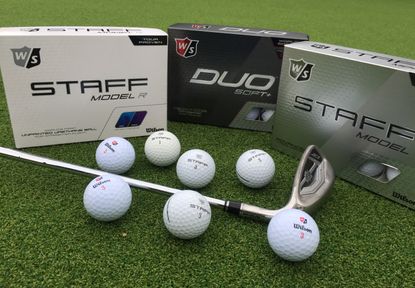

Wilson Staff may just be the most under-rated big name brand in golf. More ‘major’ tournaments have been won by professionals using Wilson Staff clubs than any other brand, yet over the last couple of decades they have become less fashionable and have fallen behind the ‘cooler’ brands such as TaylorMade, Titleist and Callaway.
You will not find too many of the world’s top players using Wilson Staff these days, although Padraig Harrington, Kevin Streelman and Gary Woodland are notable exceptions. That is no reflection on their quality, however. For club golfers, they're among the best golf balls you can purchase.
Casual golfers and newcomers to the game should be seriously looking at Wilson Staff gear due to the perfect balance they have struck between quality and price. In the iron market especially Wilson are pound for pound as good as anything out there. A set of D7 or D9 irons are ideal for mid-level or high handicap players and you will often pick them up for a few hundred pounds less than equivalent standard clubs from other brands.
In recent years Wilson have made big strides in golf ball development too and they now produce a variety of balls to rival some of the best on the market for various levels of golfer.
In fact, there is a strong case that they make the best value for money ball out there for mid-high handicappers, while they also produce a premium ball to compete with the likes of the Titleist ProV1 and TaylorMade TP5.
Here’s our handy guide to the best balls produced by Wilson and which one will suit your game.
- Best waterproofs for golf: looks like rain
- Best golf watch: which golfing wearable should you buy?
Wilson Staff Model R
Reasons to buy
Reasons to avoid
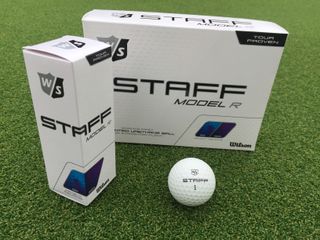
This is an interesting one because it is unpainted, or ‘raw’, as Wilson describe it.
Sign up to the T3 newsletter for smarter living straight to your inbox
Get all the latest news, reviews, deals and buying guides on gorgeous tech, home and active products from the T3 experts
Is it a gimmick or are Wilson onto something here? Their logic is that paint application can be inconsistent and sometimes there will be more paint in one dimple than others. Due to the nature of the golf ball painting process it is virtually impossible to have the paint spread perfectly evenly.
Using a UV light you can see the blotchiness on some golf balls (see below) so Wilson’s point is valid. Wilson also say that those imperfections can affect how the the golf ball flies and so they brought out an unpainted, ‘raw’ golf ball with no paint ‘splodges’ to promote an ultra consistent performance from each and every ball produced.
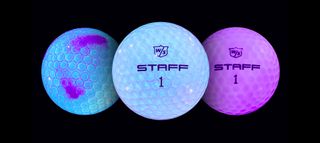
In theory all of this does make sense, but realistically the margin of difference between an imperfectly painted ball and a perfectly painted one is going to be negligible to the point of being impossible to even measure.
In fairness to Wilson, they aren’t claiming their ball flies straighter than every other ball, just that they are removing the ‘rogue’ element that you will get with an inconsistently painted golf ball.
But does that extra tiny drop of paint in a few dimples really make any difference to the accuracy of a shot? And if so, how much are we talking here? An inch? A foot? Yards? It can’t be much, surely, but at least you know with the unpainted ball that you are removing that variable entirely.
Paint is the only thing lacking with this ball as it has everything else you’d expect in a premium golf ball. Four layers, including a V-COR for increased distance and a urethane cover for maximum control.
Wilson's golf ball brainboxes have put a tremendous amount of research and thought into this product and when it comes to performance it can hold its own with anything at the top end of the market.
Durability is certainly an issue though. It turns out that there’s actually a very good reason why golf balls are painted! It has nothing to do with performance and everything to do with protecting the cover and keeping the ball looking as good as new for as long as possible.
Even after just a couple of shots with the Staff Model R you can see the ball will often be dirty looking. It isn’t glossy white to begin with but it will quickly pick up grass stains, mud marks and will generally become discoloured in no time at all. The ones I tested looked 'battle damaged' after just 10 minutes of chipping and putting.
It is important to point out here that this does not impact on performance at all but visually it will be off-putting to some golfers. You don’t expect a brand new shiny golf ball that you’ve only played two holes with to look like one that has been lying in a muddy ditch for six months.
Is this ‘raw’ model the future of golf ball tech or just a passing fad? Time will tell of course, but it seems unlikely that this will catch on. Most golfers like a shiny, brand new looking golf ball and this dirty, used look won’t appeal to the majority. Those who do play it will no doubt swear by it as it's a high quality ball. One for the golf hipsters really.
Wilson Staff Model
Reasons to buy
Reasons to avoid
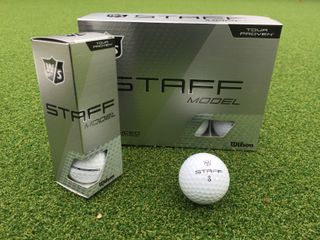
Another urethane 4-piece ball very much the same as the Staff Model R. The obvious difference is that this ball is painted, albeit with "a finely controlled application process that ensures every urethane ball leaves the factory with a near-flawless finish".
Yeah, if you're making a big deal about how flawed painted golf balls are, you better make sure the painted ones you are selling are done differently to everyone else!
Wilson market this ball as having “tour level distance optimised by a low-spinning trajectory off the tee” as well as "maximum greenside spin that delivers unparalleled stopping power".
Just like the Staff Model R it has a V-COR for increased distance off the tee and a 362-dimple pattern smooths airflow around the ball for a lower ball trajectory and maximum distance.
In terms of overall performance there is very little difference between the Staff Model and the Staff Model R and both stack up well against any other premium ball on the market, including the ProV1, TP5x and Callaway Chrome Soft.
This is a great golf ball for a single handicap player but is not ideally suited to the less accomplished player.
Wilson Staff DUO Soft+
Reasons to buy
Reasons to avoid
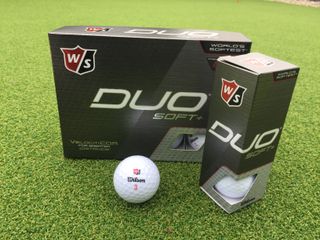
The world’s softest and longest premium 2-piece ball is how Wilson describe the DUO soft+. A bold claim perhaps, but it has plenty of substance.
It’s a 35 compression which does indeed make it as soft as anything out there, while the VelocitiCOR aids greater distance. What is VelocitiCOR? According to Frank Simonutti, Director of Golf Ball Innovation for Wilson, it’s basically “steroids for golf balls”. Unlike golfers, golf balls are allowed to be enhanced with steroids.
There is a world of difference when it comes to performance of a low compression, two-piece ball like the DUO when compared to a higher compression, premium ball such as the ProV1 for example.
One is clearly 'better' than the other and that is reflected by the difference in price and the immense popularity of one of those balls. Where things can get confusing is that for many golfers the better ball is not the expensive one that is played by so many players on the PGA Tour, it's the cheap 2-piece ball.
For a tour pro or even a single figure handicap amateur player, a ball like the DUO would harm their game but for most average players it’s the opposite. The ProV1 may be “the number one ball in golf” but that doesn’t mean it will perform better for everyone than a budget ball like the DUO will.
"How can that be?" I hear you ask.
Ok, let’s start with the driver. If you have a high swing speed the DUO is too soft a compression for your swing which results in less ball speed, and ergo less distance. For a slower swinger of the club, however, the opposite is true. The DUO would produce more distance than the tour standard ball.
Not only that, but because it spins much less it will also allow average golfers to find more fairways as it won't deviate as much with side spin from hooks or slices. So basically, it’s straighter and longer, but only if you aren’t a highly accomplished player.
With the irons it isn’t about distance. A good player will actually get more distance out of the DUO than a ProV1 but that is not a good thing. Why? Because that distance is a result of the DUO having a much lower spin rate, meaning it travels further but doesn’t stop as quickly when it lands. Good players like to be able to control their approach shots.
Seniors and higher handicap players on the other hand generally don’t have that kind of control anyway as it comes from superior ball striking. So the DUO gives them the benefit of considerably more distance with their irons shots.
Around the greens it all comes down to personal preference anyway. How a ball feels off the putter face is hugely important but it’s also very much subjective. Many golfers like the firmer feel and distinctive sound of a Callaway Chrome Soft or TaylorMade TP5. Others prefer a softer contact.
I’m very much in the latter category and of all the balls I’ve tested recently the DUO has been the one I’ve most enjoyed putting with. I love the feel of it off the putter as it’s so soft you almost don’t even feel it at all. That isn’t going to suit everyone of course.
I quite enjoyed hitting it with driver too and I got a fair amount of distance from the DUO. My swing speed with the driver averages around 95/96mph so it’s a little higher than what would be optimum for this ball (swingers of 90mph or less will see the best results) but it performed well for me, an average golfer.
It’s only with short iron approach shots where this ball’s shortcomings are noticeable, and even then it won’t be too obvious for most players. When you’re hitting an 8 or 9 iron into a green you would ideally want a little bit more feel and spin than you get from the DUO, but all things considered this is a great golf ball.
At £20 for a dozen balls this represents terrific value. Senior golfers or mid-high handicappers with a slow to medium speed golf swing will not find a better ball to suit their game and with it being such a great price it is a definite contender for the best all around value for money golf ball on the market.
Other Wilson Staff golf balls
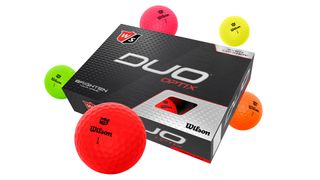
While the three mentioned above are the most popular and widely available, you are likely to come across some other varieties of Wilson Staff balls in golf shops.
Wilson Staff DUO Professional - This is a 60 compression, 3-piece ball with a urethane cover. It has many of the benefits of the DUO soft but is aimed at mid-high level players who require more spin and control on their approach shots.
Wilson Staff DUO Soft+ Women's golf ball - Basically the same as the DUO Soft+ but with a different colour logo.
Wilson Staff DUO Optix - Another soft, straight flying ball but this one comes in a matt finish and is available in several bright, semi translucent colours including pink, yellow, orange, red and green.
Dave is a distinctly average golfer with (fading) aspirations to be so much more than that. An avid collector of vintage Ping putters and the world's biggest Payne Stewart fan, Dave turned his front garden into a giant putting green to work on the weakest area of his game, but sadly to date he has seen no improvement. In addition to his work reviewing golf gear for T3, Dave is also the founder and editor of Bang Average Golf TV website.
-
 Best films for kids 2024 – The 5 movies to keep the kids endlessly entertained
Best films for kids 2024 – The 5 movies to keep the kids endlessly entertainedThe best movies available to stream to keep the kids entertained during the holiday period and beyond
By Britta O'Boyle Published
-
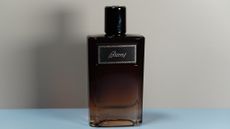 I tested Brioni Eau de Parfum Suave – it's the ultimate luxurious men's fragrance
I tested Brioni Eau de Parfum Suave – it's the ultimate luxurious men's fragranceThis will be a mainstay in my collection from now on
By Sam Cross Published